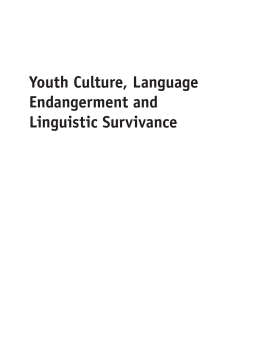
Additional Information
Book Details
Abstract
Detailing a decade of life and language use in a remote Alaskan Yup'ik community, Youth Culture, Language Endangerment and Linguistic Survivance provides rare insight into young people's language brokering and Indigenous people's contemporary linguistic ecologies. This book examines how two consecutive groups of youth in a Yup'ik village negotiated eroding heritage language learning resources, changing language ideologies, and gendered subsistence practices while transforming community language use over time. Wyman shows how villagers used specific Yup'ik forms, genres, and discourse practices to foster learning in and out of school, underscoring the stakes of language endangerment. At the same time, by demonstrating how the youth and adults in the study used multiple languages, literacies and translanguaging to sustain a unique subarctic way of life, Wyman illuminates Indigenous peoples’ wide-ranging forms of linguistic survivance in an interconnected world.
This book is essential reading for those concerned about endangered languages. Wyman complicates and problematizes our existing understanding of heritage language maintenance by examining ways in which youth develop strategies of languaging and translanguaging for linguistic “survivance.” It is an invaluable resource for students of bilingualism, for concerned educators, and for members of minority communities around the world.
With great sensitivity and insight Leisy Wyman takes us on a journey to the inner recesses of an indigenous language and culture struggling to maintain a way of life that is undergoing rapid cross-generational transformation and linguistic upheaval. Drawing on both an insider and outsider perspective, Wyman provides detailed documentation of family, community, institutional and societal influences on Yup’ik youth as they navigate the shifting linguistic ecologies impacting their homeland.
Wyman provides a wealth of information about the challenges indigenous people face today, and doe an excellent job of documenting how quickly rapid language shift and problematic cultural changes can take place.
Leisy Thornton Wyman has worked for over 20 years with Yupâ??ik communities in Alaska, and is an associate professor in the Language, Reading and Culture (LRC) program at the University of Arizona. Her scholarly works include a theme issue on Indigenous Youth and Bilingualism for the Journal of Language, Identity and Education (McCarty & Wyman, 2009), a forthcoming book on North American Indigenous youth language (Wyman et al, in progress), and a volume of Yupâ??ik elders' narratives, (Fredson et al., 1998). Her research appears in multiple edited volumes, the International Journal of Bilingual Education and Bilingualism, Journal of American Indian Education, and World Studies in Education.
Based on two decades of work with the Alaska Native village of “Piniq,” Leisy Wyman’s masterful ethnography reveals the complex ways in which youth peer culture and family language policies intersect with those of the school, how youth “talk back” to pressures of language shift, and the far-reaching impacts of tacit and official policies on a community’s linguistic future….A beautifully written sociolinguistic portrait of one community’s fight for linguistic, cultural, and educational self-determination, and a “must read” for language scholars and practitioners alike.
Wyman analyzes youth culture amid rapid language shift and delineates ways that resources for heritage language development are grouped, preserved, and eroded. She examines how these varying and unpredictable groupings drive linguistic change… centraliz[ing] youth as active agents and refut[ing] commonplace assumptions about language shift—including the role of globalized youth culture, the ascription of low status, and the absence of allegiance. [Wyman] illustrates, in concrete detail, the concepts building throughout the book, teasing out the ricocheting, variable, seemingly small factors fueling language tip. The presentation of the families’ dilemmas and responses is vivid and cogent… Throughout the study, Wyman cites a range of research to situate, counter, or support ideas and policies about language use in Piniq. Her work is original, clear, and carefully organized. Wyman's study will be invaluable for future researchers investigating schooling and shift… It will be of interest to educational policymakers and advocates, education scholars, and teacher preparation programs. Scholars, researchers, and policymakers studying land-use and language will benefit as well. The book is also a resource for students of ethnography investigating the structure and organization of multilayered studies. … Wyman beautifully demonstrates that efforts to understand cultural change must attend to intricacy and be mindful of the pitfalls of the ready-made idea.
Richardson, Sarah L. “How Do You Translate ‘Discipline Rubric’ into Yup’ik?,” review of Youth Culture, Language Endangerment, and Linguistic Survivance, by Leisy Thornton Wyman. Critical Multilingualism Studies 1:2 (2013): pp. 119-122. ISSN 2325-2871 http://cms.arizona.edu/index.php/multilingual/art
Youth Culture, Language Endangerment and Linguistic Survivance offers a broad, comprehensive, and thought-provoking overview of language shift, youth culture, and indigenous youths’ efforts for linguistic survivance in and out of school. This book is an invaluable resource for language scholars, practitioners, and students who are concerned about bilingualism and language endangerment. Readers will be able to go beyond bilingualism and better understand the challenges indigenous youth, parents, and local schools are facing today.
Yongsu Park, University of Pennsylvania, USA in Journal of Language, Identity & Education (2013) 12:5, 359-361
Table of Contents
| Section Title | Page | Action | Price |
|---|---|---|---|
| Contents | v | ||
| Acknowledgments | xi | ||
| 1Introduction | 1 | ||
| 1 Researching Indigenous Youth Language | 17 | ||
| 2 Elders and Qanruyutait in Village Life | 37 | ||
| 3 Educators, Schooling and Language Shift | 65 | ||
| 4 The ‘Last Real Yup’ik Speakers’ | 103 | ||
| 5 Family Language Socialization in a Shifting Context | 148 | ||
| 6 The ‘Get By’ Group | 199 | ||
| 7 Subsistence, Gender and Storytelling in a Changing Linguistic Ecology | 228 | ||
| Conclusion | 260 | ||
| Epilogue: Educational Policies and Yup’ik Linguistic Ecologies a Decade Later | 276 | ||
| References | 281 | ||
| Author Index | 295 | ||
| Subject Index | 298 |
